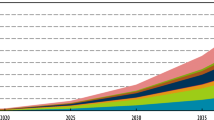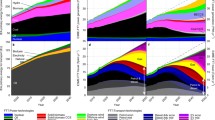Abstract
This paper examines the economic and budgetary impacts of fuel prices using a dynamic general equilibrium model of the Portuguese economy which highlights the mechanisms of endogenous growth and includes a detailed modeling of the public sector. The fuel price scenarios are based on forecasts by the US Department of Energy (DOE-US) and the International Energy Agency (IEA-OECD) and represent a wide range of projections for absolute and relative fossil fuel prices. In terms of the long term economic impact, our results suggest a 1.9 % drop in GDP in the DOE-US scenario and 1.6 % in the IEA-OECD scenario. As to the budgetary impact, higher fuel prices lead to lower tax revenues, which, coupled with a reduction in public spending, translate into lower public deficits. Accordingly, increasing fuel prices create an important policy trade off in that they can contribute to reducing the public deficit while hindering economic growth. We find that fairly strong incentives for wind energy can reduce the economic impact of fuel prices by 14.2 % in the DOE-US price scenario and 18.5 % reduction in the IEA-OECD price scenario. Finally, our results highlight the importance of public sector spending decisions and the mechanisms of endogenous growth in understanding the impact of fossil fuel prices. Indeed, a scenario of higher fuel prices would, with exogenous public decisions and exogenous economic growth assumptions, result in substantially smaller economic effects and yield adverse budgetary effects.






Similar content being viewed by others
References
Amador J (2010) Energy production and consumption in portugal: stylized facts. Economic bulletin and financial stability report articles, Banco de Portugal, Economics and Research Department
Backus D, Crucini M (2000) Oil prices and the terms of trade. J Int Econ 50(1):185–213
Bergman L (2005) CGE modeling of environmental policy and resource management. In: Mäler K-G, Vincent JR (eds) Handbook of Environmental Economics, vol 3. Amsterdam, North Holland, pp 1273–1306
Borges A, Goulder L (1984) Decomposing the impact of higher energy prices on long-term growth. In: Scarf HE, Shoven JB (eds) Applied general equilibrium analysis, Chapter 8. Cambridge University Press
Brown S, Yücel M (2002) Energy prices and aggregate economic activity: an interpretative survey. Q Rev Econ Finance 42(2):193–208
Bruno M, Sachs J (1985) Economics of worldwide stagflation. Harvard University Press, Cambridge
Carraro C, De Cian E, Tavoni M (2009) Human capital formation and global warming mitigation: evidence from an integrated assessment model. CESifo Working Paper 2874, Munich
Conrad K (1999) Computable general equilibrium models for environmental economics and policy analysis. In: van den Bergh J (ed) Handbook of environmental and resource economics. Edward Elgar, Cheltenham
Department of Energy, United States (2010) Annual Energy Outlook 2010: with projections to 2035. DOE-US/EIA-0383(2010). http://www.eia.DOE-US.gov/oiaf/aeo/pdf/0383(2010).pdf
Esteves P, Coimbra C (2004) Oil prices assumptions in macroeconomic forecasts: should we follow futures market expectations. Bank of Portugal, WP 4–04
Esteves P, Neves P (2004) Oil Prices and the economy. Bank of Portugal, Economic Bulletin December 2004
European Commission (2010) European economic forecast: autumn 2020. European Economy. Commission Staff Working Document
European Commission (2012) Statistical annex of the European economy. Directorate General for Economic and Financial Affairs (ECFIN), Spring 2012 European Economy. Brussels
Hamilton J (2003) What is an oil shock?J Econ 113(2):363–398
Hamilton J (2009) Understanding crude oil prices. Energy J 30(2):179–206
He Y, Wang S, Keung Lai K (2010) Global economic activity and crude oil prices: a cointegration analysis. Energy Econ 32(4):868–876
Jacoby H, Reilly J, McFarland J, Paltsev S (2006) Technology and technical change in the MIT EPPA model. Energy Econ 28(5–6):610–631
Jorgenson D (1998) Growth. Volume 2: energy, the environment and economic growth. MIT Press, Cambridge
Koetse M, Henri L, de Groot R, Florax J (2008) Capital-energy substitution and shifts in factor demand: a meta-analysis. Energy Econ 30(5):2236–2251
Korhonen I, Ledyaeva S (2010) Trade linkages and macroeconomic effects of the price of oil. Energy Econ 32(4):848–856
Manne A, Richels R (1992) Buying greenhouse insurance—the economic costs of carbon dioxide emission limits. MIT Press, Cambridge
Paltsev S, Reilly J, Jacoby H, Eckaus R, McFarland J, Sarofim M, Asadoorian M, Babiker M (2005) The MIT Emissions Prediction and Policy Analysis (EPPA) model: version 4. MIT Joint Program on the Science and Policy of Global Change Report 125
Pereira A, Rodrigues P (2002) On the impact of a tax shock in Portugal. Port Econ J 1(3):205–236
Pereira A, Rodrigues P (2004) Strategies for Fiscal Reform in the Context of the EMU: the case of Portugal. Rev Dev Econ 8(1):143–165
Pereira A, Rodrigues P (2007) Social security reform in Portugal: a dynamic general equilibrium analysis. Portuguese American Development Foundation, Lisbon
Pereira A, Pereira R (2011) Marginal abatement cost curves and the budgetary impact of CO 2 taxation in Portugal. College of William and Mary Economics Working Paper 105
Pereira A, Pereira R (2013) Environmental fiscal reform and fiscal consolidation: the quest for the third dividend in Portugal. Public Finance Review (Forthcoming)
Portuguese Directorate General for Geology and Energy (2012) Factura Energética. Direcção Geral de Energia e Geologia. Ministerio da Economia. www.dgeg.pt
Portuguese Ministry of Finance (2012) Estatistica das Financas Publicas. Gabinete de Planeamento, Estrategia. Avaliacao e Relacoes Internacionais, Ministerio das Financas. http://www.gpeari.min-financas.pt/
Roeger W (2005) International oil price changes: impact of oil prices on growth and inflation in the EU/OECD. Int Econ Econ Policy J 2(1):15–32
Schubert S (2009) Dynamic effects of oil price shocks and their impact on the current account. MPRA Paper 16738. University Library of Munich, Germany
Schubert S, Turnovsky S (2010) The impact of oil prices on an oil-importing developing economy. J Dev Econ 94(1):18–29
Sousa T (2011) International macroeconomic interdependence and imports of oil in a small open economy. Port Econ J 10(1):35–60
Tang W, Libu W, Zhang Z (2010) Oil price shocks and their short and long-term effects on the Chinese economy. Energy Econ 32(Supplement 1):S3–S14
Wissema W, Dellink R (2007) AGE analysis of the impact of a carbon energy tax on the Irish economy. Ecol Econ 61(4):671–683
Xepapadeas A (2005) Economic growth and the environment, Handbook of Environmental Economics. In: Mäler KG, Vincent JR (eds) Handbook of environmental economics, edn 1, vol 3, chapter 23. Elsevier, North Holland, pp 1219–1271
Author information
Authors and Affiliations
Corresponding author
Additional information
This paper is part of a project financed by the Fundação de Ciência e Tecnologia do Ministério de Ciência e Tecnologia, Portugal, reference number: PTDC/ECO/72065/2006. An early version of this paper was presented at the 4th International Meeting of the Portuguese Economic Journal. We would like to thank an anonymous referee for very detailed and thoughtful comments and suggestions.
Appendix:
Appendix:
About this article
Cite this article
Pereira, A.M., Pereira, R.M. Fossil fuel prices and the economic and budgetary challenges of a small energy-importing economy: the case of Portugal. Port Econ J 12, 181–214 (2013). https://doi.org/10.1007/s10258-013-0094-y
Received:
Accepted:
Published:
Issue Date:
DOI: https://doi.org/10.1007/s10258-013-0094-y
Keywords
- Fuel prices
- Economic performance
- Budgetary consolidation
- Dynamic general equilibrium
- Endogenous growth
- Portugal




